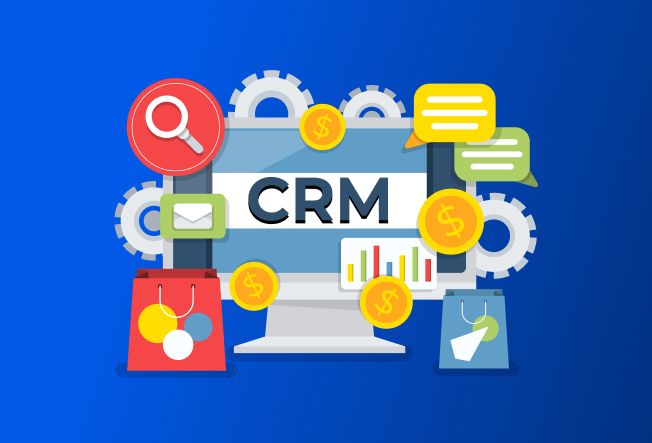From Horizontal to Vertical CRM [Is Dynamics 365 the Ideal Fit?]
Sep 03, 2024 Aiswarya Madhu
“One-size-fits-all” approach to Customer Relationship Management systems is becoming obsolete.
The move from horizontal to vertical CRMs reflects the growing recognition of the need for industry-specific solutions that cater to the unique requirements of various sectors.
In Horizontal CRM systems, the software license typically accounts for only about 10% of the total cost. The remaining 90% is often allocated to customizing the solution to fit specific industry needs.
As businesses strive to offer exceptional customer experiences, the demand for industry-specific CRM solutions that align with business-specific workflows and challenges is on the rise.
Here is a complete walkthrough of why horizontal CRMs are becoming a thing of the past and how vertical CRMs are emerging as the new standard in the industry.
On this Page
What is Horizontal CRM?
Horizontal systems are designed to serve a wide range of industries, offering general-purpose tools for sales, marketing, and customer support. Unlike vertical CRMs, which are tailored to specific industries, horizontal CRMs provide broad, flexible solutions that can be customized for various sectors. While they offer versatility and scalability, adapting these solutions to meet the unique needs of a particular industry may require additional customization.
What Is Vertical CRM?
Vertical CRMs are specialized CRM systems designed to meet the specific needs of different industries. Unlike generic, horizontal CRMs that offer broad functionalities across various sectors, vertical CRMs, also known as industry-specific CRMs, come equipped with tailored features, tools, and processes that directly address the unique demands of specific industries. Whether it’s manufacturing, healthcare, financial services, or retail, vertical CRMs provide the granularity and precision required to manage industry-specific requirements.
Read More: Discover the top trends transforming customer relationship management in 2024! From AI-driven insights to voice-activated solutions and blockchain security, these innovations are redefining how businesses connect with their customers.
Horizontal CRM is Dead Now: Why It's Time for a Change
While horizontal SaaS companies often struggle to achieve even 20% market share, Vertical SaaS companies can capture over 40% of their niche markets, leading to better pricing power and more attractive unit economics.
Some sectors, such as manufacturing, technology, and e-commerce, have standardized business models that might initially seem compatible with generic CRM solutions. However, even these industries often encounter significant challenges when relying on horizontal CRMs.
Here are some of the drawbacks of horizontal CRMs that could impact your business's success:
Lack of Industry-Specific Insights and Functionalities
Horizontal CRM systems are designed to be versatile and applicable across various industries, but this generality often comes at the cost of depth. These systems can effectively manage basic tasks such as lead tracking and customer communication, but they fall short when it comes to addressing the specific needs of particular industries. For example, a generic CRM might not have the capabilities to handle complex pricing models or manage detailed product catalogs that are critical in industries like manufacturing or wholesale distribution. Without these specialized features, businesses struggle to optimize their operations and make informed decisions, leading to lower productivity and reduced return on investment.
Inadequate Handling of Extensive Product Catalogs
Generic CRMs often fall short when it comes to managing the rich product data needed for distributors' extensive catalogs, which can include hundreds of thousands of SKUs. Sales reps can’t be expected to know every product detail offhand, but distribution-specific CRMs can integrate with ERP and PIM systems to provide comprehensive product information directly within the CRM. This integration allows sales reps to easily access crucial details like product descriptions, stock availability, and order history, something that generic CRMs simply cannot offer.
Overwhelming Competition and Feature Saturation
The horizontal CRM market is highly competitive, with thousands of companies offering similar solutions. This intense competition has led to price wars and an overwhelming number of features that are often not aligned with specific industry needs. As a result, users can experience "feature fatigue," where the abundance of unnecessary options creates confusion rather than clarity. This saturation not only makes it difficult for businesses to select the right CRM but also leads to underutilization of the software’s capabilities, further diminishing its value.
Inefficient Quoting and Sales Processes
In industries where quoting is a critical part of the sales process, horizontal CRMs often fall short. These systems typically offer limited functionality when it comes to managing quotes, tracking follow-ups, or integrating with e-commerce platforms. Without the ability to access detailed information about each quote, such as product status or customer interaction history, sales teams are left with incomplete data, hindering their ability to close deals efficiently. This lack of visibility and functionality can significantly impact revenue generation and customer satisfaction.
Microsoft Dynamics 365 offers precisely that—an integrated platform that brings industry-focused capabilities, allowing businesses to address their unique challenges while enhancing operational efficiency, compliance, and customer engagement.
So now your question will be: Why can't I just build my own workflows using a horizontal CRM?
Of course, if your organization has a sizable IT team or budget, it might seem feasible to choose a horizontal CRM, develop custom data integrations, and design workflows that reflect your unique business processes. However, this approach comes with significant drawbacks.
Building a custom CRM requires a considerable investment of time and resources, often involving senior staff who need to thoroughly understand the business to convey requirements to developers. This process can take months or even years, with no guarantee that the final product will work as intended. Each custom workflow and calculation increases the risk of errors, especially without a quality assurance process, which many organizations are not equipped to handle.
On the other hand, platforms like Microsoft Dynamics 365 offer industry-specific CRM functionalities designed to meet the needs of sectors like healthcare, finance, and manufacturing. These "deep vertical" CRMs come with pre-configured workflows and processes that have been tested and refined across multiple organizations. This means you can leverage industry best practices and avoid the high costs and risks associated with building a custom CRM from scratch.
Is a Vertical CRM Right for Your Business? Here's How to Decide
Selecting the right CRM is crucial for any business aiming to optimize its customer relationship management. While general-purpose CRMs cater to a broad audience, vertical CRMs are designed specifically for certain industries, offering tailored features and functionalities that address unique business needs. Here’s how to determine if a vertical CRM is right for your business:
Consider Your Industry's Regulation and Compliance Needs
If your business operates within a highly regulated industry—such as healthcare, insurance, or government—you likely need a CRM that offers built-in compliance features. Vertical CRMs in these sectors are specifically designed to meet stringent regulatory requirements, such as HIPAA for healthcare or GDPR for data protection. These systems include pre-configured settings and workflows that ensure your business remains compliant without the need for extensive customization.
Evaluate the Complexity of Your Business Processes
Industries like construction, hospitality, and consulting often have intricate workflows that require more than what a general-purpose CRM can offer. Vertical CRMs come equipped with industry-specific features that streamline complex processes. For instance, in construction, a vertical CRM might include tools for managing contract bids, tracking project milestones, and automating compliance documentation. This level of specialization reduces the time and effort required to manage operations, allowing your business to focus on growth.
Assess the Scale of Your Workforce and Client Management
For businesses managing large workforces or extensive client bases—such as real estate firms, automotive sales, or franchise management—a vertical CRM can provide the tools necessary to handle these demands efficiently. These CRMs offer features like advanced lead management, automated client communication, and detailed performance tracking, which are crucial for maintaining productivity and ensuring client satisfaction across multiple agents or resellers.
Identify the Need for Industry-Specific Features
If your business requires specific functionalities that general-purpose CRMs don’t provide, such as invoice management in accounting or telephony integration in call centers, a vertical CRM is likely the better option. These systems are built with the needs of specific industries in mind, offering tools that cater directly to the operational requirements of businesses within those sectors. This specialization not only enhances efficiency but also ensures that your CRM supports your business's core functions without the need for extensive modifications.
Consider the Importance of Advanced Reporting and Analytics
Businesses in sectors like finance, manufacturing, and legal services often require detailed reporting and analytics to inform decision-making and ensure compliance. Vertical CRMs are equipped with advanced reporting capabilities tailored to the needs of these industries, allowing for better insights and more accurate forecasting. This is particularly important in industries where data-driven decision-making is critical to success.
Determine the Volume and Complexity of Customer Interactions
If your business handles a high volume of customer interactions across multiple channels—such as in retail, customer service, or hospitality—a vertical CRM can help manage these efficiently. These systems are designed to provide a seamless customer experience across all touchpoints, ensuring that interactions are consistent, timely, and personalized. Features like omnichannel communication, automated follow-ups, and detailed customer profiles are integral to maintaining high levels of customer satisfaction and loyalty.
Analyze the Complexity of Your Project or Contract Management Needs
For industries that manage multiple complex projects or contracts—such as construction, legal services, or manufacturing—a vertical CRM offers project management tools tailored to industry-specific needs. These tools help streamline the management of tasks, deadlines, and resources, reducing the risk of errors and ensuring projects are completed on time and within budget.
Why Dynamics 365 is the Ideal Vertical CRM for You?
Microsoft Dynamics 365 stands out as an ideal solution for 'vertical' markets, offering specialized capabilities that cater to the unique needs of various industries. Whether it’s healthcare, construction, distribution, or legal services, Dynamics 365 provides tailored tools that help businesses streamline operations, enhance customer interactions, and drive growth. Its cloud-based architecture on Azure ensures that organizations can rapidly deploy and scale solutions that align with their specific market demands, all while staying competitive in a digital-first world.
Here are some of the key reasons why Dynamics 365 is particularly suited for vertical markets:
Industry-Specific Cloud Solutions: Tailored for Precision
Microsoft has meticulously developed industry-specific cloud solutions within the Dynamics 365 ecosystem, each designed to tackle the distinct operational, regulatory, and customer service challenges faced by different sectors.
Microsoft Cloud for Financial Services
This cloud solution integrates Dynamics 365 with tools that focus on financial risk management, regulatory compliance, and customer relationship management. For financial institutions, it’s not just about managing data; it’s about leveraging that data to drive growth while remaining compliant with stringent regulations. The platform’s AI-driven insights help financial institutions predict customer needs, personalize service offerings, and optimize decision-making processes. This directly contributes to better customer retention and growth in a highly competitive market.
Microsoft Cloud for Healthcare
Healthcare providers need more than just a CRM—they need a platform that ensures data security, streamlines patient care, and improves operational workflows. Dynamics 365, through the Microsoft Cloud for Healthcare, integrates electronic health records (EHRs) with advanced analytics, offering a 360-degree view of patient information. This enables healthcare providers to deliver personalized care, track patient outcomes, and maintain compliance with healthcare regulations like HIPAA, all while reducing operational costs through automation and improved data management.
Microsoft Cloud for Retail
Retailers face the dual challenge of meeting evolving consumer expectations and managing complex supply chains. The Microsoft Cloud for Retail, powered by Dynamics 365, offers solutions that unify customer data across online and offline channels, enabling personalized marketing, dynamic pricing, and seamless shopping experiences. Moreover, its advanced supply chain management tools help retailers optimize inventory, reduce waste, and ensure timely delivery, directly impacting the bottom line and customer satisfaction.
Explore how Microsoft Dynamics 365 for Retail can revolutionize your retail operations with AI-driven insights and streamlined workflows.
Download the Whitepaper
Microsoft Cloud for Nonprofit
Nonprofit organizations often struggle with donor management, fundraising efficiency, and program delivery. Dynamics 365’s nonprofit cloud solution addresses these challenges by providing tools for managing donor relationships, tracking donations, and optimizing program impact. The platform’s built-in analytics offer insights that help nonprofits tailor their fundraising strategies, ensuring resources are used effectively to maximize impact.
Microsoft Cloud for Sustainability
As sustainability becomes a core focus for businesses worldwide, the Microsoft Cloud for Sustainability provides a comprehensive platform for tracking and reducing environmental impact. Dynamics 365’s sustainability tools help organizations monitor their carbon footprint, optimize resource usage, and report on sustainability metrics, enabling them to meet regulatory requirements and build a reputation as an environmentally responsible entity.
Industry Accelerators and Common Data Model: Accelerating Time-to-Value
Complementing these industry-specific clouds, Microsoft has developed Industry Accelerators within the Dynamics 365 and Power Platform ecosystems. These accelerators extend the Common Data Model to include industry-specific entities, making it easier for Independent Software Vendors (ISVs) and solution providers to build and deploy industry-focused applications. Here’s an overview of the current industry accelerators and their use cases:
Automotive Accelerator
This accelerator provides entities and data models tailored to the automotive industry, including dealer management systems, vehicle service histories, and customer engagement tools specific to automotive sales and services. It enables automotive businesses to streamline operations, improve customer relationships, and enhance sales processes.
Education Accelerator
Designed for educational institutions, this accelerator includes data models for student management, curriculum tracking, and academic performance monitoring. It supports educational institutions in managing student relationships, improving educational outcomes, and ensuring compliance with educational standards.
Government Accelerator
This accelerator offers entities and workflows that cater to the unique needs of government agencies, such as case management, regulatory compliance, and public service delivery. It enables government organizations to enhance citizen engagement, streamline services, and ensure transparency and accountability.
Media and Entertainment Accelerator
Tailored for the media and entertainment industry, this accelerator provides tools for content management, audience engagement, and advertising sales. It helps media companies manage content lifecycles, optimize audience interactions, and maximize revenue from advertising.
Nonprofit Accelerator
This accelerator extends the Common Data Model to support nonprofit operations, including donor management, fundraising, and program tracking. It enables nonprofits to optimize resource allocation, enhance donor relationships, and improve the impact of their programs.
Telecommunications Accelerator
This accelerator includes entities and processes specific to the telecommunications industry, such as service provisioning, customer care, and network management. It helps telecom companies improve service delivery, enhance customer experiences, and manage complex network infrastructures.
Conclusion
The rise of Vertical CRM solutions highlights the importance of industry-specific tools that go beyond generic functionalities. Microsoft Dynamics 365 stands out as a powerful platform designed to meet these demands, offering deep industry integration and tailored solutions that drive business success.
At Nalashaa Digital, we specialize in Dynamics 365, bringing years of expertise to help you tailor this platform to your unique needs. Whether you're planning to transition to Dynamics 365 or seeking to unlock its full potential, we’re here to provide the strategic support and insights you need. Our tailored solutions ensure that Dynamics 365 not only fits your current business processes but also positions you for future growth and competitiveness.
Don't just adapt—excel. Reach out to us today to discover how we can help you fully leverage Dynamics 365 to transform your business.
Recent Posts

Dynamics 365 Field Service Capabilities [A-Z Explained]
Jul 02, 2025

Agentic AI vs. AI Agents [Misunderstanding Will Cost You Big]
Jun 23, 2025

5 Best CRMs for Social Media Marketing [2025 Updated List]
Jun 09, 2025
Category
Our Expertise
About Author

Aiswarya Madhu
Aiswarya Madhu is an experienced content writer with extensive expertise in Microsoft Dynamics 365 and related Microsoft technologies. With over four years of experience in the technology domain, she has developed a deep understanding of Dynamics 365 applications, licensing, integrations, and their role in driving digital transformation for organizations across industries.
Never Miss News
Want to implement Dynamics 365?
We have plans which will meet your needs, and if not we can tweak them around a bit too!


